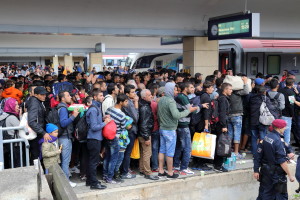Border Regulations Threaten Schengen
Austria’s Interior Minister Johanna Mikl-Leitner has announced a series of new border regulations that will limit the number of refugees permitted to travel through the country. As of February 19, Austria will now accept only 80 asylum applications per day, according to the EU Observer. The number of asylum seekers permitted to travel through Austria en route to other countries has also been capped at 3,200. These new restrictions follow an announcement last month that over the next four years, Austria’s refugee population will be limited to 1.5% of its total population.

In addition to enacting its own border controls, Austria expressed support for the "Visegrad Four," The Local Europe notes. This group, which calls for tighter border controls inside the European Union’s passport-free Schengen Zone, is composed of Hungary, Poland, Slovakia and the Czech Republic.
The Schengen Zone was established in 1985 to facilitate travel between 26 European countries without border controls, but rising waves of immigration have put pressure on several EU member states to re-establish their borders.
Many Europeans have criticized Austria’s border restrictions, predicting that they will infringe on the ease of trade currently enjoyed under the Schengen Agreement. French think tank France Strategie has estimated that actions such as Austria’s, which undermine the Schengen Zone, will cost the EU more than €110 billion over the next 10 years. Euronews estimated that the new regulations could cost the Austrian transportation industry €8.2 million per day.
European officials are not optimistic about the current refugee crisis either. Kris Pollet, the Senior Policy Officer at the European Council on Refugees and Exiles, expressed this sentiment in a recent interview with the Chicago Tribune, noting, “It’s a dangerous situation. Anything can happen.”
Note: This article appeared in an abridged format for print on February 23, 2016.
